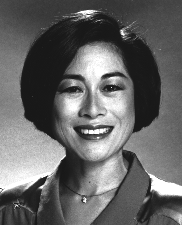Page 38
[Begin Tape 1, Side A]
Moorhus: Back to 1974.
Tanabe: That's a good year.
Moorhus: Yes, twenty years ago, when you came to KHON. Start at the beginning. You told me last time about the way you got the offer to come here. Did KOMO in Seattle offer you anything as a balance to this offer? Did they try to keep you?
Tanabe: Yes. They asked me to stay, because I'd only been there four years and I was doing quite well. Part of the reason, I'm sure, is because I got off to a real good start with an Emmy and with a documentary, and I was able to establish credibility quite well. Plus, I was doing quite a number of reports through ABC.
Moorhus: Through the network?
Tanabe: Through the network. Every affiliate, through the network, is able to send stories if the network feels it's something of value, and so I was starting to get fairly good nationwide attention. My parents, who were on Okinawa at the time, also were able to see stories that I had done, because for some reason the military was able to pick up on some of them. So I suppose that KOMO considered me to be an asset.
But my feeling was that what was offered in Hawaii was something that I would not be able to get in Seattle for a very long time, and that was, number one, the higher visibility as an anchor, and that always adds in the professional life of a television journalist. It adds to the stature, and it also broadens my own portfolio as a television broadcaster.
The second point was that it offered me an opportunity to go more into the management of the news operation. In the four years that I was at KOMO, I wasn't that interested in it at the time because I was more interested in establishing myself, getting the respect of my colleagues, making a mark for myself as a reporter, and getting some of that down pat. I was really ready to move on to something else professionally and personally, too. For the first time in a long time, some of the family obligations had been settled to a certain extent, and so my husband and I were freer to be able to pull up roots and move somewhere else. At the time, it was just a three-year contract, so I was assuming that perhaps I would be back. Of course, that's twenty years ago. It was a long contract. [Laughter.]
Moorhus: There was also an attraction to this culture, is that right?
Tanabe: Yes, there was a very strong attraction, especially after I had checked around and found that there had been no local or non-white male anchor at the television station, and I just felt that was wrong. It was totally wrong, because a newscast should really reflect the community which it serves,

